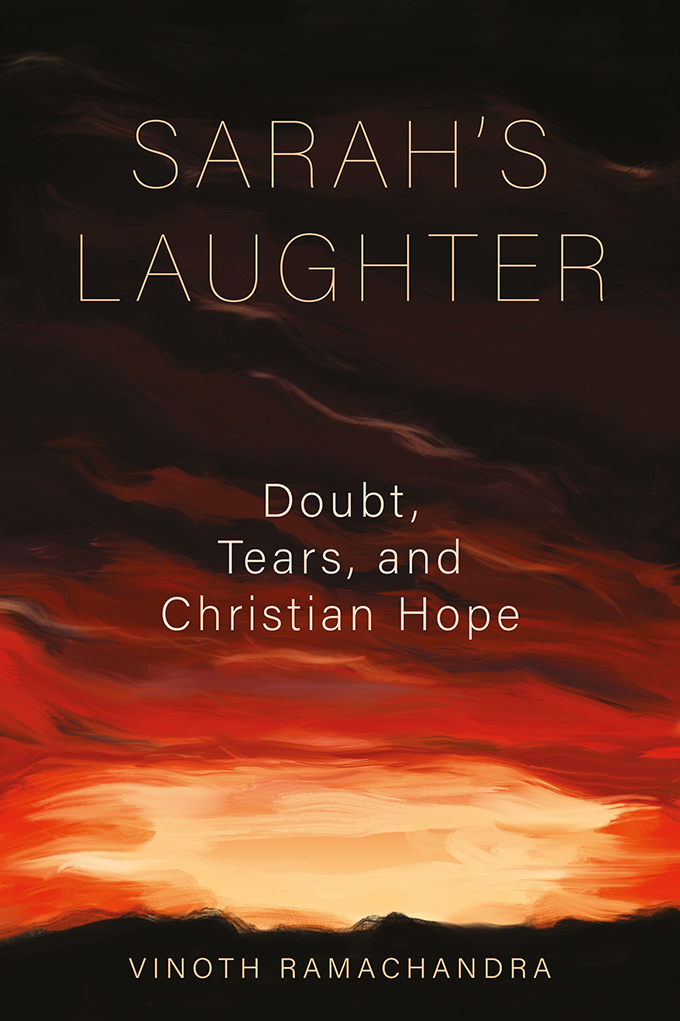The Questions of Grief
By Vinoth Ramachandra
An excerpt from Sarah’s Laughter: Doubt, Tears, and Christian Hope (Langham Global Library), 2020.
As I write, a novel coronavirus SARS-CoV-2 (resulting in an illness known as COVID-19) is spreading across the globe, with terrible long-term consequences. The elderly and those suffering from underlying health conditions are especially at risk. The hardest hit, from both the virus and the measures taken by governments to contain it, are the poor, vulnerable communities in every nation. Those who survive on daily wages will not receive economic bail-outs. For many poor countries a slowing of the economy spells the collapse of their already fragile health systems, resulting in more deaths, not only from COVID-19 but from hunger and other illnesses as well. The pandemic has exposed the exploited and unappreciated underclasses on whose labour the rest of us are dependent. It is tragically ironic that the very people whom affluent societies routinely ignore – migrant farm workers, those providing social care and cleaning services, hospital nurses and orderlies, supermarket attendants, etc. – are at the frontline of managing the pandemic; while the people whom the media obsess over – the celebrities, politicians, bankers, and CEOs – steal away on their private jets to their luxury villas where they can self-isolate.
On a personal level, my wife Karin died six months before my visit to the 1918–19 influenza exhibition in London. In her last sermon in our church just before Christmas 2017, she framed her illness from cancer and impending death within the story of Mary’s Song (the Magnificat): the Saviour who will one day turn the world right-side up, but meanwhile we have to live with many unanswered questions. Mary embraced the social stigma of being an unmarried mother as well as the prospect of losing her son to an early death. Most of us ask, “Why me?” when affliction suddenly comes upon us; but, as Karin pointed out, we should be asking instead, “Why not me?” After all, we live in a messed-up world where men, women and children die every minute from accidents, violence, illness, famine or natural disasters. Christ never promised us immunity from these. As Christians, we are part of a suffering humanity that still awaits redemption.
But the questions of grief can be tormenting, often even incapacitating. And grief arises not only with the loss of a loved one to death, but with the loss of health, employment and reputation; with infertility and disability; and, furthermore, with the painful realization that injustice and wickedness often go unchecked. In the Second Epistle of Peter, we read of Lot, the nephew of Abraham, living in the ancient cities of Sodom and Gomorrah, being “distressed by the depraved conduct of the lawless (for that righteous man, living among them day after day, was tormented in his righteous soul by the lawless deeds he saw and heard)” (2 Pet 2:7–8).
There is a long, rich and oft-ignored tradition of lament that runs through the Bible. It begins with the startling words in the early chapters of Genesis attributed to God himself: “The LORD saw how great the wickedness of the human race had become on the earth, and that every inclination of the thoughts of the human heart was only evil all the time. The LORD regretted that he had made human beings on the earth, and his heart was deeply troubled” (Gen 6:5–6). It culminates in the cry of the martyrs around the throne of God in the vision of John the Seer: “How long, Sovereign Lord, holy and true, until you judge the inhabitants of the earth and avenge our blood?” (Rev 6:10).
The two questions that are uppermost in the lament tradition are “Why, Lord?” and “How long, O Lord?” But the question “Why?” is not a call for a theoretical explanation of suffering and evil. It is an expression of existential anguish over the silence and inaction of God in the face of threat, disaster or unmitigated suffering. It is really the question, “Why, Lord, are you hidden, indifferent or absent?” The sting in innocent suffering for the believer is not the pain itself nor the injustice of it, but the sense of God-forsakenness. This is what is unendurable. Trust in God has been weakened. Is God’s power limited to acts of vindication in the past or can he still be trusted to make a difference in the world today?
More than a third of the Psalms, which was the hymnbook of ancient Israel and the early church, are categorized as psalms of lament. They express confusion, distress, pain, indignation, fear, outrage and protest, as a result of either individual suffering or collective humiliation and oppression. Whereas for the prophets, human sin is the root cause of lament, frequently in the Psalms there is no reliable connection between suffering and sin. Typical is Psalm 44:20–26:
If we had forgotten the name of our God
or spread out our hands to a foreign god,
would not God have discovered it,
since he knows the secrets of the heart?
Yet for your sake we face death all day long;
we are considered as sheep to be slaughtered.
Awake, Lord! Why do you sleep?
Rouse yourself! Do not reject us forever.
Why do you hide your face
and forget our misery and oppression?
We are brought down to the dust;
our bodies cling to the ground.
Rise up and help us;
rescue us because of your unfailing love.
Or consider the socio-political criticism of Psalm 10:1–4, 12:
Why, LORD, do you stand far off?
Why do you hide yourself in times of trouble?
In his arrogance the wicked man hunts down the weak,
who are caught in the schemes he devises.
He boasts about the cravings of his heart;
he blesses the greedy and reviles the LORD.
In his pride the wicked man does not seek him;
in all his thoughts there is no room for God . . .
Arise, LORD! Lift up your hand, O God.
Do not forget the helpless.
And the cry of personal affliction in Psalm 88, perhaps the bleakest of all the psalms:
Is your love declared in the grave,
your faithfulness in Destruction?
Are your wonders known in the place of darkness,
or your righteous deeds in the land of oblivion?
But I cry to you for help, LORD;
in the morning my prayer comes before you.
Why, LORD, do you reject me
and hide your face from me?
From my youth I have suffered and been close to death;
I have borne your terrors and am in despair.
Your wrath has swept over me;
your terrors have destroyed me.
All day long they surround me like a flood;
they have completely engulfed me.
You have taken from me friend and neighbour –
darkness is my closest companion.
(vv. 11–18)
Lament is the verbalizing of raw pain, the bringing to speech of suffering. It is not unbelief, but honest and faithful speech that keeps the conversation with God going when the psalmist and his community experience not the promised land of peace and blessing but the wasteland of meaninglessness and oppression. “It is the bitter complaint of one who despairs, who has no one else to whom he can turn. He clings to God against God . . . Doubt about God, even the kind of despair that can no longer understand God, receives in the lament a language that binds it to God, even as it accuses him.” (Claus Westermann, “The Role of the Lament in the Theology of the Old Testament,” Interpretation 28 (Jan. 1974): 34.)
Walter Brueggemann writes about these psalms:
The use of these “psalms of darkness” may be judged by the world to be acts of unfaith and failure, but for the trusting community, their use is an act of bold faith, albeit a transformed faith. It is an act of bold faith on the one hand, because it insists that the world must be experienced as it really is and not in some pretended way. On the other hand, it is bold because it insists that all such experiences of disorder are a proper subject for discourse with God.
That is why no questions are “off-limits,” no speech addressed to God deemed too “uncivil” or “impolite” for prayer. The psalmist believes in a God who is big enough to handle his doubts, protests and even his rage.
Vinoth Ramachandra, Sarah’s Laughter (Chapter 1: Why, O Lord, Do You Hide Your Face?) (Langham Global Library), 2020. Used with permission.
Vinoth Ramachandra lives in Colombo, Sri Lanka. He has served internationally for many years with International Fellowship of Evangelical Students (IFES), the Faraday Institute for Science and Religion, Micah Global, and A Rocha International. He has a PhD in nuclear engineering from the University of London, UK, and is the author of several books and essays on topics relating Christian theology to issues in the global public square.

